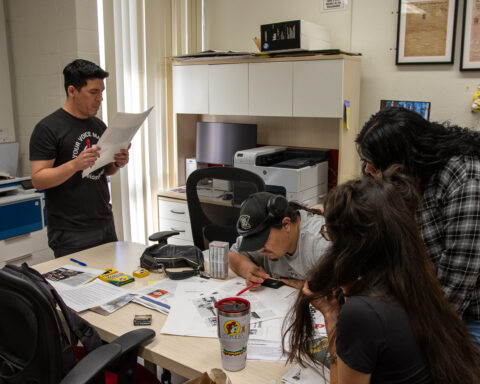
Last week’s storm hardly helped the state’s record low water supply. Experts explore alternatives as supplies dwindle.
By Jose Servin
California is still dry. Despite recent showers, the level of rainfall is nine inches below average in the fourth year of one of state’s worst droughts, leading cities to encourage and in some cases require residents to start saving water.
California receives an average of 15 inches of rain per year, but this year so far only four or so inches have fallen. This barely helps alleviate the dry conditions, according to PRISM, a climate group supported by the United States Department of Agriculture.
A difference of a few inches of water may seem unimportant, but the amount missing from reservoirs, lakes, marinas and rivers is staggering when low waterlines show the lack of volume. Looked at another way, hydrologist Alan Nestlinger says that if spread across the Santa Ana College campus, those missing 11 inches of rainwater would fill 6,750 shipping containers stacked 367 miles high.
Communities across the state are responding by cutting back on water use.
This is what Orange County is doing to combat the crisis:
Groundwater Replenishment
A facility run by the Orange County Water District in Fountain Valley treats sewer water and refills the water table underneath Orange County to prevent intrusion from ocean salt water.
Critics call it the Toilet to Tap program because of the use of sewer water, but this process is actually very clean, as proven by monthly water quality tests.
Rebates and Restrictions
Programs implemented by water suppliers in Orange County provide rebates to people who purchase low-water-use toilets, efficient washing machines, and low-flow shower heads.
There are also rebates for people who replace their green lawns with drought friendly, or zerophytic plants. Restrictions include fines for watering driveways and other forms of wasteful use.
Desalination
The private company Poseidon Water is currently building a desalination facility in north San Diego County that will remove the salt from ocean water, clean it, and make it potable.
While this process can make use of the abundance of ocean water, it is extremely expensive when compared with other solutions, and produces less usable water.
“If we get longer drought periods, we’re going to be forced to do desalination at some point,” said Santa Ana College professor of geography Bill Courter.
Desalination may be a long-term solution, but the most direct response to the drought remains reduced water usage by California businesses and residents.
Water Source Alternatives
Desalination
San Diego-based Poseidon Water is building a facility that will separate salt from sea water. The process is more costly than other methods.
Toilet to Tap
Sewer water is treated, filtered and funneled into the water supply at the OCWD Fountain Valley retention basin. Water tests confirm its purity.
- The two-party system is failing us. - October 19, 2024
- Read our Fall 2023 Print: Vol. 100 No. 1 - October 23, 2023
- Santa Ana College Awarded State Department of Finance Grant - April 2, 2015











